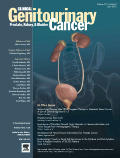
Clinical Genitourinary Cancer
Scope & Guideline
Exploring breakthroughs in cancer treatment and management.
Introduction
Aims and Scopes
- Clinical Trials and Treatment Efficacy:
The journal regularly publishes studies comparing various treatment modalities, including immunotherapy, chemotherapy, and targeted therapies, focusing on their efficacy and safety in patients with genitourinary cancers. - Biomarkers and Genetic Factors:
Research related to biomarkers, genetic mutations, and their implications on treatment outcomes and disease progression are a significant focus, contributing to personalized medicine in oncology. - Patient-Reported Outcomes and Quality of Life:
The journal emphasizes the importance of patient-reported outcomes and quality of life assessments, exploring how treatments affect patients' day-to-day experiences. - Health Disparities and Socioeconomic Factors:
Investigations into how socioeconomic status, race, and geographic disparities influence treatment access, outcomes, and overall cancer care are increasingly central to the journal's scope. - Emerging Therapies and Novel Approaches:
The publication highlights innovative therapeutic approaches, including the use of novel drug combinations, immunotherapy, and advancements in surgical techniques. - Real-World Evidence:
The journal frequently includes studies that provide real-world evidence on treatment patterns, outcomes, and patient management strategies across diverse populations.
Trending and Emerging
- Immunotherapy and Combination Treatments:
There is a growing emphasis on the exploration of immunotherapy, particularly in combination with other treatment modalities, highlighting its potential to improve outcomes in various genitourinary cancers. - Genomic Characterization and Personalized Medicine:
Research focusing on genomic profiling, including the identification of actionable mutations and their implications for personalized treatment strategies, is increasingly prominent. - Real-World Data and Patient-Centric Research:
Studies utilizing real-world data to assess treatment efficacy, patient adherence, and long-term outcomes are trending, providing insights that complement clinical trial findings. - Health Equity and Disparities Research:
There is a notable increase in research addressing health disparities, aiming to understand how social determinants affect cancer outcomes and treatment accessibility. - Neoadjuvant and Adjuvant Therapies:
The exploration of neoadjuvant and adjuvant therapy strategies, particularly in muscle-invasive bladder cancer and advanced prostate cancer, is gaining attention as a means to improve surgical outcomes. - Digital Health and Telemedicine:
The integration of digital health technologies, including telemedicine and patient-reported outcomes through digital platforms, is emerging as a vital area of research in the context of healthcare delivery.
Declining or Waning
- Traditional Chemotherapy Protocols:
Research focused solely on standard chemotherapy regimens is waning as newer targeted therapies and immunotherapies gain traction and prominence in treatment discussions. - Surgical Techniques Without Multidisciplinary Context:
Papers discussing surgical techniques in isolation are less common, with a shift towards studies that integrate surgical approaches within multidisciplinary treatment frameworks. - Basic Science Research Without Clinical Application:
There is a noticeable decline in publications that focus solely on basic science findings without direct clinical implications, as the journal aims to bridge laboratory discoveries with patient care. - Outdated Screening Practices:
Research centered on traditional screening methods that lack modern technological integration is becoming less relevant, as the field shifts towards more advanced imaging and diagnostic techniques.
Similar Journals
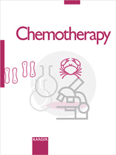
CHEMOTHERAPY
Illuminating Pathways in Infectious Disease TreatmentCHEMOTHERAPY, published by KARGER, is a premier academic journal established in 1960, dedicated to disseminating cutting-edge research and advancements in the fields of drug discovery, infectious diseases, oncology, and pharmacology. With an impressive Scopus ranking placing it in the Q2 category for major disciplines such as Drug Discovery and Infectious Diseases, this journal provides an invaluable platform for researchers and professionals aiming to explore new therapeutic approaches and methodologies. Located in the heart of Switzerland, its publications are a key resource for anyone looking to stay informed about the latest developments and trends in the pharmacological sciences. Researchers can benefit from its diverse scope while contributing to a growing body of knowledge that emphasizes the importance of effective chemotherapeutic strategies in modern medicine. Despite not being an Open Access journal, CHEMOTHERAPY remains committed to maintaining a rigorous peer-review process, ensuring the highest quality of published work.

Turk Onkoloji Dergisi-Turkish Journal of Oncology
Shaping the future of oncology with dedicated research and expertise.Turk Onkoloji Dergisi - Turkish Journal of Oncology, published by KARE PUBL, serves as a vital platform in the field of oncology, specifically catering to the Turkish-speaking research community and contributing to global discourse. With an ISSN of 1300-7467, this journal, which has been in circulation since 2007 and continues until 2024, recognizes the importance of advancing medical knowledge in cancer research through rigorous peer-reviewed articles. Although currently positioned in the Q4 category of oncology journals with a Scopus rank of #344 out of 404, the journal is dedicated to fostering significant research insights and innovative perspectives on cancer treatment and prevention. While it does not currently offer open access, its content is essential for professionals, researchers, and students aiming to enhance their understanding of oncology developments in Turkey and beyond. The Turkish Journal of Oncology not only aspires to improve the quality of cancer care but also strives to enhance collaboration among researchers, thereby influencing future oncology practices.

CURRENT TREATMENT OPTIONS IN ONCOLOGY
Connecting Research to Clinical Excellence in OncologyCURRENT TREATMENT OPTIONS IN ONCOLOGY, published by Springer, is a premier academic journal dedicated to disseminating cutting-edge research and advancements in the field of oncology and pharmacology. With a commendable impact factor and ranked in the Q1 category in both oncology and pharmacology for 2023, this journal positions itself as a leading resource for researchers, healthcare professionals, and students alike, offering insightful reviews and original articles that critically evaluate treatment methodologies and clinical practices. Covering a wide scope of topics from early detection to innovative therapies, it fosters the translation of research findings into clinical applications. With its convergence years spanning from 2000 to 2024, CURRENT TREATMENT OPTIONS IN ONCOLOGY continues to be at the forefront of oncological research, providing a platform for scholars to explore the latest therapeutic options and improve patient outcomes. Highly regarded in the academic community, this journal is essential for anyone looking to stay informed about the dynamic landscape of cancer treatment.
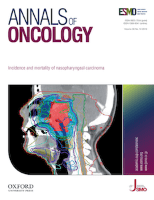
ANNALS OF ONCOLOGY
Advancing cancer research, one study at a time.ANNALS OF ONCOLOGY, published by Elsevier, stands as a premier journal in the field of oncology, hematology, and general medicine, with a notable impact factor that underscores its significance in advancing cancer research and clinical practice. Established in 1990, this journal has become a highly respected source of information, consistently ranked in the Q1 category in its respective fields, showcasing its influence and credibility (Rank #4/404 in Oncology and Rank #2/137 in Hematology as per Scopus rankings). With a focus on innovative therapies, clinical trials, and emerging research, ANNALS OF ONCOLOGY serves as an essential resource for researchers, clinicians, and students dedicated to unraveling the complexities of cancer treatment and care. Although offering restricted access options, its impactful studies and discoveries continue to shape the future of oncology.

Tumori Journal
Fostering Collaboration in the Fight Against Cancer.Tumori Journal is a distinguished publication in the field of oncology, dedicated to advancing the understanding and treatment of cancer since its inception in 1946. Published by SAGE Publications Ltd, this Italian journal serves as a pivotal platform for researchers, clinicians, and academicians to disseminate cutting-edge findings in cancer research and related areas of medicine. With an impressive record of contributions spanning multiple decades, Tumori Journal aims to foster collaboration and dialogue among professionals in the oncology community. Although classified in the Q4 category for Cancer Research and the Q3 category for both Medicine (miscellaneous) and Oncology as of 2023, the journal continues to draw interest with its rigorous peer-review process and commitment to quality. Researchers are encouraged to explore innovative methodologies and share impactful clinical insights through the journal, which also ranks within the top tiers of Scopus metrics for oncology and cancer research domains. With a growing emphasis on accessible research, Tumori Journal remains an essential resource in the continuous fight against cancer.

Translational Oncology
Empowering Researchers to Impact Oncology OutcomesTranslational Oncology is a premier open access journal published by Elsevier Science Inc, dedicated to the rapidly evolving field of cancer research and oncology. Since its inception in 2008, the journal has been a vital platform for the dissemination of innovative research and findings that bridge the gap between laboratory discoveries and clinical applications. With an impressive impact factor and ranked Q2 in Cancer Research and Q1 in Oncology, it occupies a prominent position in the academic landscape, helping to shape the future of cancer therapeutics and patient care. The journal offers valuable insights across a diverse array of topics, including molecular biology, genetic factors in cancer, and innovative treatment strategies, ensuring relevance and engagement for its readership. As it converges toward 2024, Translational Oncology continues to attract a global audience of researchers, healthcare professionals, and students committed to advancing our understanding of cancer and enhancing clinical outcomes.

Current Problems in Cancer: Case Reports
Transforming patient care through diverse oncology perspectives.Current Problems in Cancer: Case Reports is a prominent scholarly journal published by Elsevier, focusing on critical case reports within the field of oncology. Since its transition to Open Access in 2020, it has enhanced accessibility for researchers and healthcare professionals seeking to share and discuss unique clinical scenarios and insights that advance cancer treatment and patient care. Operating from the United States, this journal aims to address the important and often intricate challenges faced in oncology, facilitating a platform for knowledge exchange and the exploration of new perspectives in cancer management. Despite its current Q4 category ranking in the 2023 oncology category of Scopus with a rank of #359/404, its goal is to enrich the academic discourse by featuring diverse case reports and promoting evidence-based practices. As the journal evolves from 2021 to 2024, it seeks to impact the field by inviting researchers, professionals, and students to contribute their findings, ultimately fostering a collaborative environment for tackling the complexities of cancer.
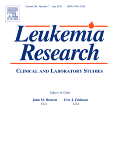
LEUKEMIA RESEARCH
Pioneering research for innovative leukemia treatments.Leukemia Research is a prominent academic journal dedicated to advancing the field of hematology and oncology, focusing on the latest research developments related to leukemia and other hematological disorders. Founded in 1977 and published by Pergamon-Elsevier Science Ltd in the United Kingdom, this esteemed journal has established itself as a vital resource for researchers and clinicians alike. With an impressive impact factor and categorized in the top quartiles of Cancer Research and Hematology, it provides a platform for high-quality research articles, reviews, and clinical studies that contribute to a deeper understanding of leukemia's complexities. Although not an Open Access journal, Leukemia Research ensures widespread dissemination of knowledge crucial for developing innovative treatment strategies and improving patient outcomes. Researchers, professionals, and students in the fields of hematology and oncology will find this journal an invaluable asset in staying at the forefront of leukemia research, as it prepares to expand its impact through converged years of publication extending into 2024.
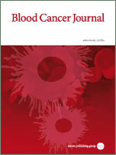
Blood Cancer Journal
Transforming insights into impactful treatments.Blood Cancer Journal, published by SPRINGERNATURE, is a leading open-access journal that has been at the forefront of hematology and oncology research since its inception in 2011. With an impressive impact factor and a commitment to disseminating high-quality research, it holds a prestigious Q1 ranking in both hematology and oncology categories as of 2023. The journal is dedicated to publishing innovative studies, comprehensive reviews, and insightful commentaries that advance our understanding of blood cancers, making it an essential resource for researchers, healthcare professionals, and students in the field. Its open-access model ensures that groundbreaking research is accessible to a global audience, promoting collaborative efforts to enhance treatment methodologies and patient outcomes. With a strong reputation illustrated by its Scopus rankings—8th in hematology and 30th in oncology—Blood Cancer Journal exemplifies excellence and leadership in the ever-evolving landscape of cancer research.
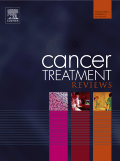
CANCER TREATMENT REVIEWS
Elevating cancer treatment knowledge for all.Cancer Treatment Reviews, published by Elsevier Science Ltd, is a leading international journal dedicated to the exploration and advancement of therapeutic strategies in oncology. With an impressive impact factor that reflects its status in the field, this journal is classified within Q1 quartile rankings in Medicine (Miscellaneous), Oncology, and Radiology, Nuclear Medicine and Imaging, as of 2023. The journal has a rich lineage, having been established in 1974 and consistently evolving to encompass the latest breakthroughs and methodologies in cancer treatment. A vital resource for researchers, clinicians, and students alike, it aims to promote understanding and application of effective interventions, thereby contributing to improvements in patient outcomes. By prioritizing high-quality reviews, Cancer Treatment Reviews plays an essential role in bridging the gap between current research and clinical practice, making it an indispensable asset in the continuous fight against cancer.